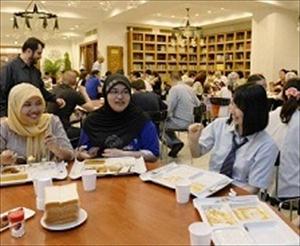(Ahlul Bayt News Agency) - “(Fasting) allows me to improve myself,” Benjdi El Mehdi, 27, a student from Morocco who was eagerly anticipating the meal, told The Japan Times.
“In fact, it is fun.”
Ramadan, the holiest month in Islamic calendar, started in Japan on Wednesday, July 10.
In Ramadan, adult Muslims abstain from food and drink between dawn and sunset. Muslims hold family gatherings to break their fast together.
Bringing iftar gatherings culture to the Japanese people, Tokyo Camii, the largest mosque in Japan, hosts daily iftar at the mosque facility each evening during Ramadan month for about 200 visitors.
These iftars are usually attended by men and women from Turkey, Indonesia, Ghana and other nationalities.
These iftars started originally as a form of charity served to poor Muslims and travelers.
A few year ago, Tokyo Camii mosque adopted the custom, offering the meals to people of all nations and beliefs.
During the holy month of Ramadan, fasting is meant to teach Muslims patience, self-control and spirituality, and time during the holy month is dedicated for getting closer to Allah though prayers, reading the Noble Qur’an and good deeds.
The daily Ramadan iftars were offering an open window on Islamic culture and traditions during the holy month.
Islam began in Japan in the 1920s through the immigration of a few hundreds of Turkish Muslims from Russia following the Russian revolution.
In 1930, the number of Muslims in Japan reached about 1000 of different origins.
Another wave of migrants who boosted the Muslim population reached its peak in the 1980s, along with migrant workers from Iran, Pakistan and Bangladesh.
Japan today is home to a thriving Muslim community of about 120,000, among nearly 127 million in the world's tenth most populated country.
/149

